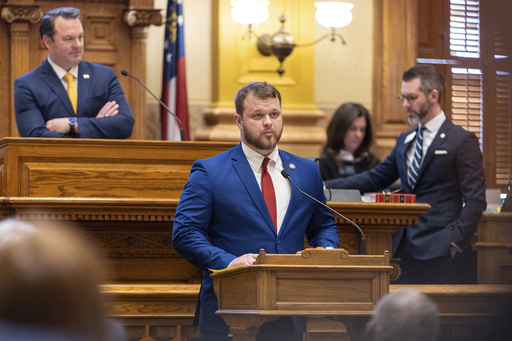
Georgia senators cast their votes on Friday in favor of Governor Brian Kemp’s significant legislation aimed at curbing lawsuits, with a tally of 33-21. This decision came after some Republican senators secured additional concessions that were necessary for obtaining the majority required to pass the bill.
The measure, known as Senate Bill 68, is now headed to the House for further consideration as Governor Kemp continues his efforts to promote this initiative through political and lobbying channels. Another proposed bill, which seeks to limit third-party funding for lawsuits, awaits its turn for discussion in the Senate.
The legislation introduces stricter criteria for property owners’ accountability regarding injuries incurred on their premises. It also prevents attorneys from receiving duplicate fees for the same case. Additionally, it allows for separate trials to establish liability and assess damages and aims to enable defendants to have baseless cases dismissed before they incur significant pretrial costs.
Senate President Pro Tem John Kennedy, a Republican from Macon and the bill’s sponsor, stated that this effort seeks to stabilize costs for healthcare providers, business owners, and Georgia consumers by balancing the civil justice system. “The cost of doing nothing is incredible,” he emphasized, acknowledging the need for reform in the current system.
Notably, Democratic Senator Emanuel Jones of Decatur bucked party lines to endorse the bill, while the sole Republican dissenting was Senator Colton Moore of Trenton. Advocates argue that the proposed tort reform will assist businesses, doctors, property owners, and others in reducing litigation costs and lowering insurance premiums. Critics, however, contend that there is no evidence to indicate a reduction in insurance rates and express concerns that victims may find it difficult to receive compensation.
“What we see here is not a solution for a broken system,” remarked Senator Nabilah Islam Parkes, a Democrat from Duluth. “It’s essentially creating a crisis that justifies stripping away consumer protections, ultimately benefitting large insurance companies.” An amendment proposed by Islam Parkes to cap insurance rate increases according to inflation was dismissed by the Senate.
In response to ongoing negotiations, a compromise was reached concerning how jurors establish medical damages. Presently, jurors only review hospital bills prior to insurer negotiations, but Governor Kemp argued that displaying only final amounts led to inflated damages claims. The agreement allows jurors to examine both the billed amount and the actual costs incurred by patients, enabling them to determine appropriate damages.
Republican Senator Bo Hatchett from Cornelia commented on the compromise, stating, “What we’ve come up with is, tell the jury the truth. If the jury wishes to know if the plaintiff has insurance, show them. If they wish to understand the total bill, show them that as well.”
This negotiation helped alleviate opposition from Hatchett and some other Republican attorneys, facilitating the bill’s passage through the Senate. The vote followed a strong warning from Cody Hall, a political advisor to Kemp, who indicated that the governor might financially back challengers to any Republican opposing or amending the proposal.
Hall stated, “We will ensure that our supporters are recognized, but we will also remind voters of those who do not align with us.” Both pro and anti-bill lobbyists are investing heavily into their campaigns, and there is speculation about a potential special session if Kemp’s legislation fails to pass. Prior to the Senate vote, clerks distributed numerous letters from business associations endorsing the proposed measure.
In response, Democrats introduced an alternative proposal, claiming that portions of Kemp’s bill went too far. Senate Minority Leader Harold Jones II noted, “You basically foreclosed the courthouse,” arguing for the need to limit circumstances under which property owners can be held liable for injuries related to criminal acts on their properties. They also sought to protect businesses from liability as long as they implement security measures, asserting clarity on how high-crime areas should not automatically implicate owner responsibility.

